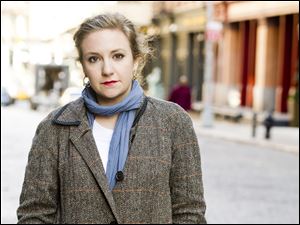
‘Girls’ leads new wave in comedy
Raunchy HBO series grabs 5 Emmy nominations
7/24/2012
The TV industry isn't accustomed to celebrating raunchy, edgy shows such as Girls, the HBO series crafted by 26-year-old Lena Dunham. But the five Emmy nominations it grabbed last week reflect how television is increasingly driven by younger, hipper — and feminine — sensibilities.
LOS ANGELES — The TV industry isn't accustomed to celebrating raunchy, edgy shows such as Girls, the HBO series crafted by 26-year-old Lena Dunham. But the five Emmy nominations it grabbed last week reflect how television is increasingly driven by younger, hipper — and feminine — sensibilities.
After years of disdain from the men who run the business ("I don't like any women comedians," Jerry Lewis famously pronounced in 1998), women are making inroads in comedy.
And never has that dynamic been more evident than on cable networks, where women are free of the content restrictions of broadcast television and — beyond the surprise success of the smash female-skewing comedy feature Bridesmaids — of the commercial imperatives of feature films, where teenage boys still typically rule.
Indeed, Girls is at the vanguard of an industry-wide charge toward narrowly focused, female-centric scripted series that now dot the entire cable dial. Another HBO freshman, Veep, with former Seinfeld star Julia Louis-Dreyfus as the nation's harried first female vice president, also got an Emmy comedy nod, joining the established veteran NBC's 30 Rock, created by and starring Tina Fey.
"This is part of a trend in the world of women wanting to hear their own stories told by women and not by men in suits or focus groups," Dunham said from the set of Girls in New York, where she expressed surprise at getting so many nominations.
Girls itself might have had trouble cracking a prime-time lineup just a few years ago.
A frank, arty, and sometimes downbeat look at the career and romantic travails of a twentysomething aspiring novelist played by Dunham, who also created the series, the show has a scant audience, averaging barely 1 million viewers, or a fraction of those for a middling broadcast sitcom.
It takes a direct approach to sexuality that may discomfit some viewers; the second episode of the just-concluded Season 1 was titled "Vagina Panic."
The show is part of a larger programming move away from mainstream fare.
This year for the first time ever, major-broadcast network shows with wider appeal were entirely shut out of the drama series race, including CBS' legal drama The Good Wife. PBS' British period piece Downton Abbey was the sole non-cable exception. Showtime's Homeland, an espionage thriller starring Claire Danes as a deeply troubled CIA operative, was among the top nominees.
Programmers have been targeting female viewers for years. Women make up 53 percent of prime-time audiences, according to Nielsen, with men dominating only during major sporting events.
What's new is that the shows are seeking narrower slices of the female audience. In the 1980s and '90s, broadcasters highlighted the changing roles of professional and working-class women with hit comedies such as Murphy Brown, Roseanne, and Ally McBeal. Girls and other acclaimed new shows go far beyond traditional gender breakdowns and mirror larger social shifts, analysts say.
The new shows' main inspiration may be HBO's Sex and the City, an enormously popular sitcom from the late 1990s, based on the writing of Candace Bushnell, which headlined four career women in a glamorized New York and treated handsome men as romantic appendages — a total gender reversal of the traditional sitcom.